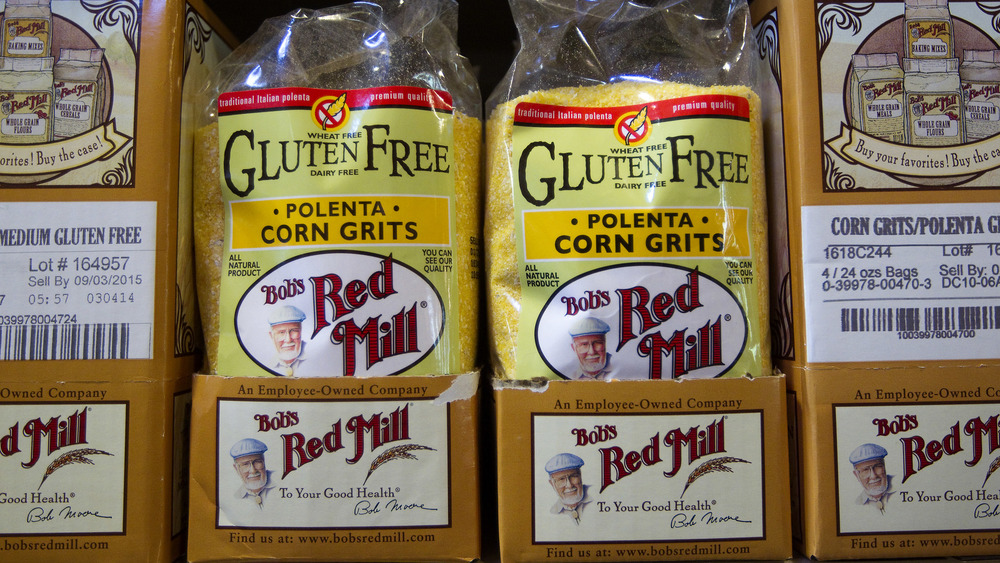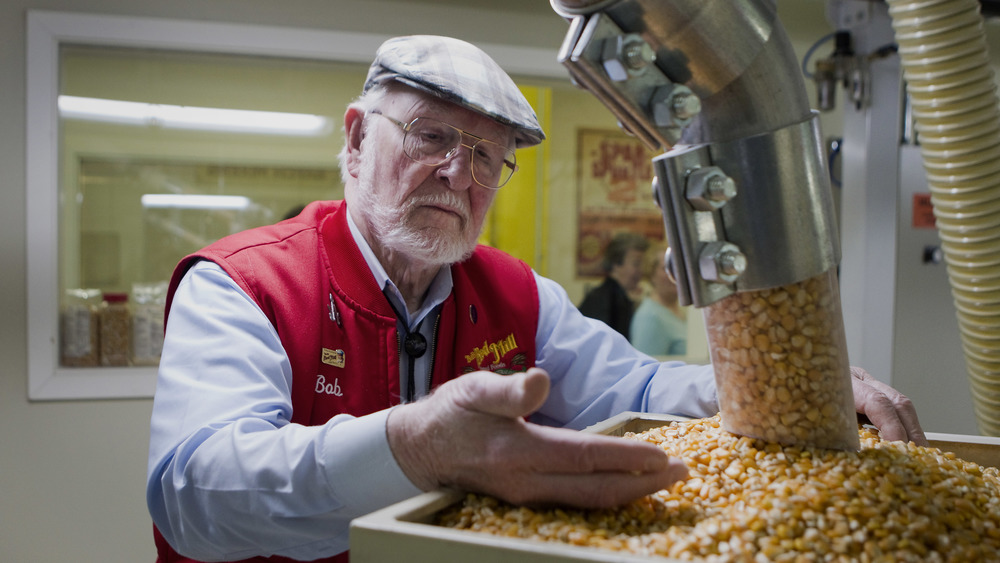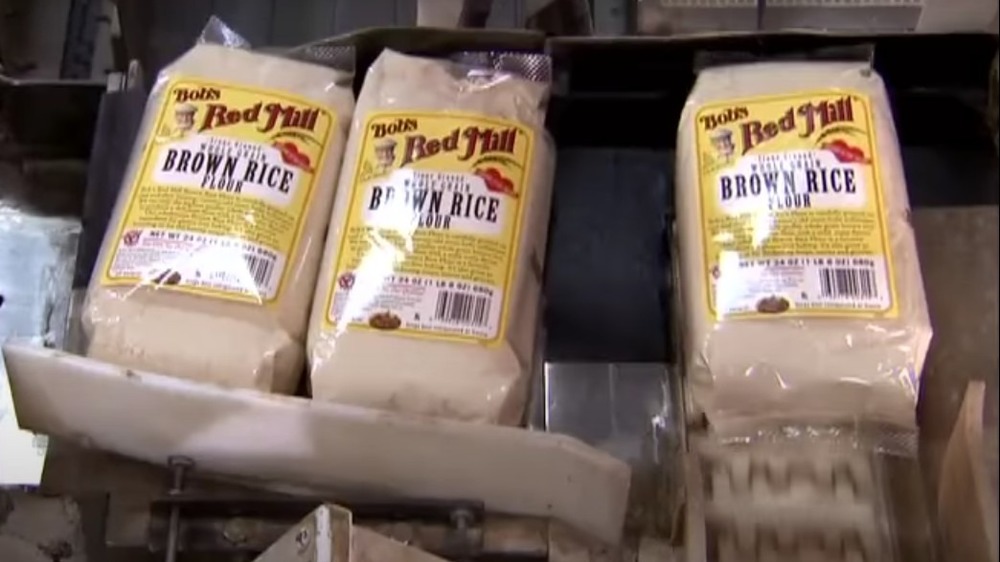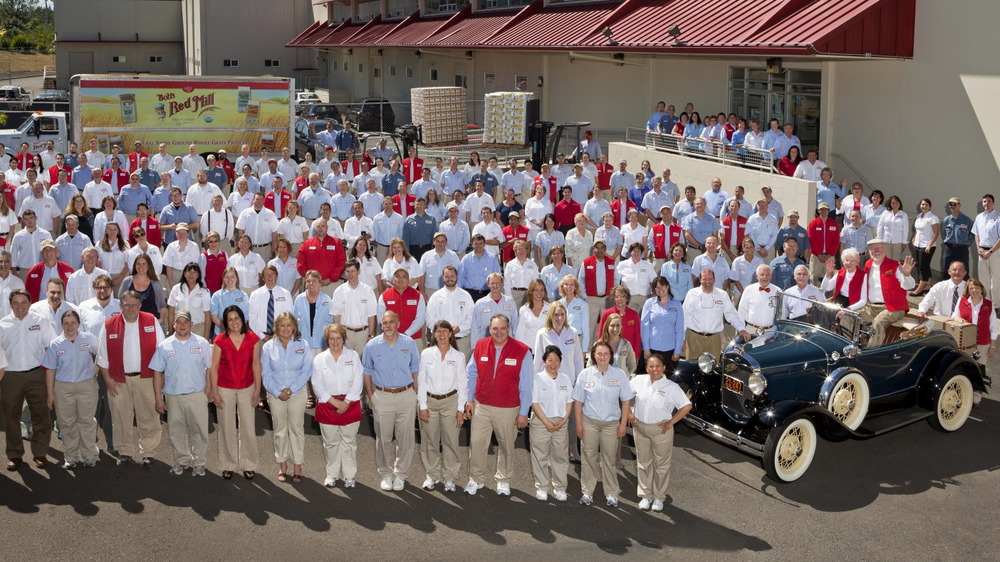The Truth About Bob's Red Mill
What's your favorite Bob's Red Mill product? Maybe one of their granola blends to start your day, or granola to make a killer trail mix. Perhaps the stone-ground flours and corn meal, which according to TheKitchn were some of the first products sold by the company. Bob's Red Mill is also a go-to resource for gluten-free and paleo-friendly baking ingredients.
The story, according to the Bob's Red Mill website, is that the company began in 1978 in Milwaukie, Oregon. The mission was to spread the word about the health benefits of natural foods, flours, to create stone ground flours on site, and to make these and other natural ingredients available to the local community. In just over a decade, Bob's Red Mill products were being distributed to stores nationwide, and in another 10, internationally.
So what's the true story behind Bob's Red Mill? Turns out, the hugely successful company has had an interesting story of family, loss, and even destiny.
Bob is a real person
With some food brand mascots, it's sometimes unclear whether or not they're real people. (Case in point: First We Feast says the Quaker man pictured on Quaker Oats products was completely made up.) In the case of Bob's Red Mill, however, Bob is a real person. Bob Moore is the man who founded and still runs the company. In videos on the Bob's Red Mill website, Moore signs off by saying, "I'm Bob Moore, and that's me on the package."
Bob and his wife Charlee, who lived in California at the time, were determined to raise their three sons on wholesome, natural foods (via TheKitchn.) Charlee loved baking, and her lucky family enjoyed her home-baked whole grain breads instead of overly processed store breads.
The Bob's Red Mill website shares that Moore became fascinated with the history and mechanics of grain mills after finding an old book about milling at a local library. He scoured the area for mill parts, including the huge, round grindstones used to pulverize grains into flour. He opened his first company, Moore's Flour Mill, in 1974 in Redding, California. His sons eventually took the helm, so that Bob and Charlee could pursue other interests.
The founder of Bob's Red Mill studied at a seminary
Incredibly, according to the George Fox University Journal, Bob Moore left Moore's Flour Mill to retire and attend seminary school. In an article he wrote that was published in Guideposts in 2013, Moore shared that he was fascinated with learning and translating Greek and Hebrew, to deepen his understanding of the Bible. His adult sons were ready and willing to take over the mill. Moore shocked his employees with the announcement that he was retiring, and that he and his wife were going back to school.
While studying at the seminary (today known as Portland Seminary of George Fox University), Moore and his wife walked together daily throughout the nearby neighborhoods. As though guided by destiny, one of these walks took them past an abandoned grain mill. And it was for sale. His wife couldn't believe it when, in that moment, her husband decided he wanted to leave the seminary and get back into the milling business (via CNN.) Moore wrote in Guideposts that the abandoned mill was a wreck, but he knew he could resurrect it. Rebuilt and restored, this was the beginning of Bob's Red Mill.
They sell flour, and a whole lot more
The company website says that the mill opened in Milwaukie, Oregon in 1978, milling corn and other natural,whole grains into flours and packaged cereals. According to NPR, it was a few years later that Moore began to take an interest in ingredients used to make gluten-free products. After helping the Gluten Intolerance Group secure a supply of xanthan gum, an ingredient used to replace gluten in baked goods, he learned more about celiac disease. This disease causes intestinal damage due to the inability to digest gluten.
NPR shares that in the early '80s, people with celiac disease had few choices in gluten-free breads and foods, let alone ingredients to make their own. Bob Moore changed that he began to make his own line of gluten-free products. The company had relocated to a larger plant, and the extra room allowed him to process and package ingredients under strict quality controls.
Today the Bob's Red Mill catalog includes almost 200 different products, including over 100 gluten-free products. They still carry dozens of varieties of oats, grain and nut flours, corn meal, baking ingredients, cereal, and yeast. Bob's red Mill has convenience foods too, like oat snack bars, baking mixes, dried soup mixes, and instant oatmeal cups.
The business nearly went under after a devastating fire
In an interview with TheKitchn, Moore shared, "I've had the privilege of going broke twice in my life." The first time he lost everything was after a failed stint as a gas station owner in California in the '50s. The second time was in 1988, when a fire completely destroyed the iconic mill that he had worked so hard to open after leaving the seminary.
According to the Portland Business Journal, the fire, an act of arson, completely destroyed the mill and equipment. All that was left were the two enormous grindstones that had been used. A news interview shortly after the fire with Portland, Oregon television station KATU (on YouTube) shows Moore clearly shaken as he speaks near the ruins of his beloved mill, expressing doubt that his business could survive the disaster.
Fortunately for Bob's Red Mill fans, the company did make a comeback. Moore was able to reopen the business in a newer and larger facility, and it rapidly grew into the successful enterprise it is today (via the Portland Business Journal). Though the facilities may be modern, Moore shares on his company's website that he continues to use the same, time-honored method of stone grinding the grains.
Bob gave his company to his employees
You're supposed to receive gifts when it's your birthday, but owner Bob Moore decided to give one to his employees instead: his whole company. According to Oregon Live, in 2010, on his 81st birthday, Moore created an Employee Stock Ownership Plan (ESOP) that gave all of Bob's Red Mill employees shares of stock in the company. This move was a complete surprise to his workers, and an extraordinary decision, considering how frequently he was approached by others who wished to buy Bob's Red Mill outright. He shared with ABC News that the offers were "countless", but that he felt an obligation to honor the commitment his employees had made — some of them for decades — to the business.
According to the company website, the company continues to be owned 100 percent by its employees today. Medium shares that the value Moore places in his staff is truly inspiring. He has shared his profits with them, holds birthday and dinner parties with them, and celebrates their anniversaries, births of their kids, and other special events in a monthly newsletter. And even now, in his 90s, Moore continues to work with, lead, and inspire his employees at his beloved mil





